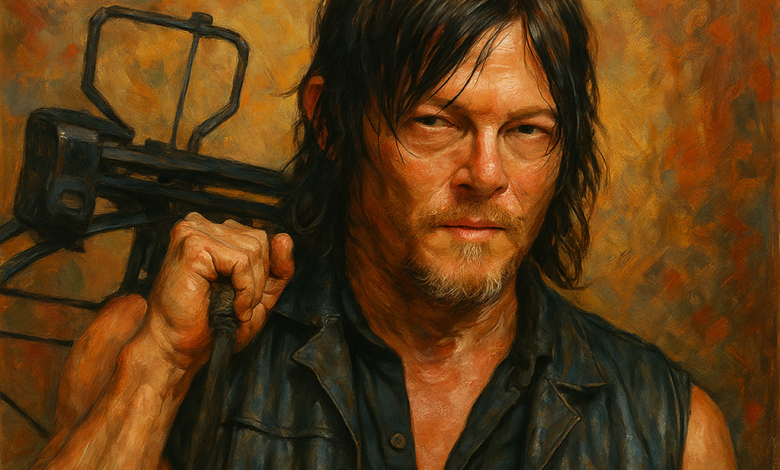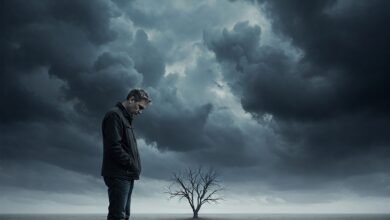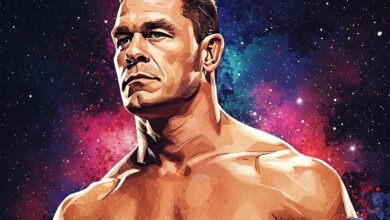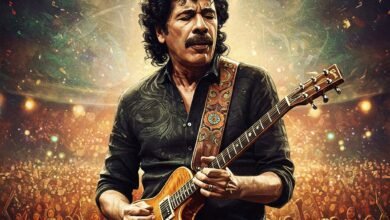Exploring Daryl Dixon: The Complex Protagonist of The Walking Dead

Introduction to Daryl Dixon
Daryl Dixon, portrayed by Norman Reedus, is one of the most compelling and multifaceted characters in the acclaimed television series The Walking Dead. Originally introduced as a rugged and somewhat antagonistic character, Daryl quickly evolved into a beloved protagonist, capturing the hearts of audiences with his complexity and depth. His character development reflects not only personal growth but also the harsh realities of a post-apocalyptic world.
Daryl’s journey begins with his tumultuous relationship with his older brother, Merle Dixon. Merle’s aggressive personality and struggles with addiction placed a significant burden on Daryl, who often found himself in the shadows, vying for his brother’s approval. This formative relationship helped shape Daryl’s resilient yet vulnerable nature, instilling in him both survival instincts and emotional scars that would be explored throughout the series. The apocalypse serves as a backdrop for his transformation, forcing Daryl to confront his past and redefine his identity beyond that of “Merle’s brother.”
The evolution of Daryl Dixon reflects the broader themes of survival, redemption, and the search for belonging within The Walking Dead. As we delve deeper into his character, it becomes evident that Daryl’s journey is not only about surviving the apocalypse but also about reclaiming his humanity amidst chaos.
The Lone Wolf Persona
Daryl Dixon, a prominent figure in “The Walking Dead,” embodies the archetype of the ‘lone wolf.’ This persona stems from a combination of his traumatic upbringing and the harsh realities of a world overrun by the undead. Born into a troubled family, Daryl faced neglect and abuse, which significantly influenced his development and perspective on relationships. Growing up alongside an erratic brother, Merle, Daryl learned to rely on himself for emotional and physical survival, leading him to adopt a solitary approach to life.
The ‘lone wolf’ demeanor is not merely a personality trait for Daryl; it is a necessary survival mechanism in the apocalyptic landscape. His ability to navigate through perilous situations while remaining emotionally detached helps him to maintain a semblance of control amidst chaos. This strength often manifests in his exceptional skills as a hunter and tracker, enabling him to thrive where others might falter. However, this self-sufficiency is a double-edged sword. While it allows Daryl to survive the violent encounters they face, it also isolates him from potential allies and meaningful connections that could offer support and companionship.
Throughout the series, Daryl’s interactions with other characters reveal the complexities of his ‘lone wolf’ persona. Initially, he appears emotionally distant and reluctant to engage with the group dynamics. Yet, as the narrative progresses, there are glimpses of vulnerability that hint at his desire for connection, indicating a struggle between his ingrained survival instincts and the human need for companionship. This evolution portrays Daryl as a deeply layered character — one who grapples with his past while navigating the uncertainties of a post-apocalyptic world. His journey reflects not just his battle against external threats but also an internal quest for belonging and acceptance.
His Strong Moral Compass
Daryl Dixon, one of the most prominent characters in “The Walking Dead,” is characterized by an unwavering commitment to his personal code of ethics, which serves as his strong moral compass. Throughout the series, Daryl consistently navigates a world rife with ethical dilemmas and harsh survivalist realities, ultimately making choices that underscore his innate sense of right and wrong. This characteristic not only distinguishes him from many other characters but also significantly influences the dynamics within the groups he becomes part of.
One poignant example of Daryl’s moral integrity occurs during his interactions with fellow survivors. Unlike some characters who resort to deception or brutality to survive, Daryl frequently puts the welfare of others above his own desires. For instance, when confronted with a situation involving a group member at risk, Daryl often takes a stand to protect them, even if it compromises his safety. This tendency highlights his empathetic nature and fortifies his ally’s trust, reinforcing a sense of loyalty and camaraderie that contrasts with the often ruthless environment of the series.
Moreover, Daryl’s moral compass clashes with the more pragmatic, sometimes cold-blooded choices made by other characters, such as Negan or even Rick at times. These stark contrasts accentuate the complexities of survival ethics portrayed in the narrative. Daryl’s resistance to abandoning his principles often leads him to question the morality of his peers’ actions, urging others to reflect on their own choices and consequences. His strong sense of morality becomes a beacon of hope amidst chaos, reminding his companions of their humanity and the importance of preserving their values in dire circumstances.
Throughout various arcs, Daryl’s steadfast adherence to his ethics ultimately cultivates a deeper sense of community and shared responsibility within the group, showcasing how individual moral values can be essential in navigating the treacherous landscape of a post-apocalyptic world.
Complex Emotional Depth
Daryl Dixon, portrayed by Norman Reedus in the acclaimed series The Walking Dead, is an intriguing character whose emotional complexity offers a compelling examination of human vulnerability amidst chaos. Initially introduced as a rough and rugged survivor, Daryl quickly evolves into a multi-dimensional protagonist whose emotional depth becomes increasingly evident throughout the series. Beneath his tough exterior lies a character grappling with profound grief and trust issues, shaped significantly by the harrowing experiences within a post-apocalyptic world.
One of the defining moments that illustrates Daryl’s emotional depth is his intense grief over the loss of significant figures within his circle. The death of friends, such as Beth Greene, profoundly impacts Daryl, often manifesting in moments of solitude and reflection. This grief is not merely a plot device but serves to enrich our understanding of Daryl as a character. His mourning triggers a vulnerability that starkly contrasts with his usual tough demeanor, allowing viewers to witness a man overcome by the weight of loss, struggling to maintain his sense of self amidst ongoing tragedy.
Furthermore, Daryl’s struggles with trust highlight another layer of his emotional complexity. Initially a lone wolf with deep-seated mistrust towards others, he learns to forge connections, particularly with characters like Carol Peletier and Rick Grimes. Daryl’s relationship with Carol, in particular, offers a poignant example of healing and intimacy. Their bond illustrates his capacity for emotional connection, as they provide each other with solace in a world filled with despair. Similarly, his alliance with Rick evolves from wariness to deep camaraderie, showcasing the transformative power of trust and friendship.
Through these connections and emotional trials, Daryl Dixon captures the essence of human complexity, making him one of the most relatable and poignant characters in The Walking Dead’s narrative landscape.
Skills and Survival Instincts
Daryl Dixon, a central figure in “The Walking Dead,” is renowned for his exceptional skills and keen survival instincts, which have pivotal implications for both his own longevity and the safety of his companions. Among his most notable talents is his expertise in hunting. Daryl’s proficiency with various weapons, particularly his crossbow, showcases his precision and adaptability in a world fraught with danger. This skill provides not only sustenance but also defense against the ever-present threats of the undead and hostile humans alike.
In addition to hunting, Daryl possesses advanced tracking abilities. His understanding of the terrain and awareness of animal behavior allow him to navigate through both the wilderness and urban settings effectively. This talent is critical during supply runs or while evading undesirable encounters, showcasing his competence in what is often a chaotic and unpredictable environment. Furthermore, his experience in warfare further amplifies his capability to protect himself and those he cares for. Daryl’s tactical thinking and resourcefulness in engaging with adversaries have repeatedly demonstrated his ability to devise strategies that ensure the group’s survival.
The apocalypse has undeniably honed Daryl’s innate talents, transforming him from a solitary figure to a reliable leader within his group. The necessity of adapting to a post-apocalyptic world has contributed significantly to the sharpening of his instincts, enabling him to anticipate threats and respond swiftly. Each experience Daryl encounters reinforces his skills, crafting a character that is both resilient and resourceful. As a result, he has become an invaluable member, whose skills and instincts serve a vital role in the ongoing struggle for survival. This evolution illustrates not only Daryl’s personal growth but also the overarching theme of adaptability in a world turned upside down.
Relationships and Loyalty
Daryl Dixon, one of the most intriguing characters in “The Walking Dead,” exhibits complex relationships that significantly influence his portrayal and development throughout the series. From his tumultuous beginnings, Daryl has transitioned into a key figure whose loyalty is often tested in a world rife with danger and moral ambiguity. His relationships with other characters reveal his commitment, fragility, and growth, underscoring the pivotal role that loyalty plays in his life and actions.
Initially, Daryl’s connection with his brother Merle was fraught with conflict and resentment. Their relationship exemplified a classic dichotomy of loyalty and betrayal. Merle’s harshness often forced Daryl to confront his own sense of identity, ultimately leading him to seek familial loyalty in more supportive figures, particularly Rick Grimes. Through this bond with Rick, Daryl discovers a new model of brotherhood, grounded in mutual respect and shared purpose. Their camaraderie illustrates how loyalty can evolve and lead to personal transformation, particularly in a hostile environment where trust is scarce.
Furthermore, Daryl’s relationships with characters such as Carol Peletier and Michonne enrich his narrative. With Carol, Daryl’s loyalty is rooted in shared experiences of loss and survival, fostering a bond that transcends mere friendship. Their loyalty to each other demonstrates how these relationships can serve as lifelines amid dire circumstances. Michonne’s alliance further accentuates Daryl’s evolving perspective; her strong moral compass and resilience prompt him to reflect on his own values and actions.
Ultimately, Daryl Dixon’s loyalty encapsulates his essence as a survivor in “The Walking Dead.” His journey illustrates that loyalty is not merely about allegiance to individuals but also a profound commitment to one’s evolving sense of self and morality in a chaotic world. Understanding Daryl’s relationships deepens our appreciation of his character, showcasing how loyalty shapes his decisions and defines his interactions.
Growth and Transformation
Daryl Dixon’s journey throughout “The Walking Dead” is a remarkable narrative of growth and transformation, showcasing the complexities of his character in a world fraught with despair and chaos. Initially introduced as a solitary figure, Daryl epitomizes rugged individualism, often relying solely on his skills as a tracker and hunter. This independence, however, soon becomes a source of both strength and isolation, emphasizing his initial reluctance to form connections with others.
As the series progresses, pivotal moments catalyze Daryl’s evolution, marking significant shifts in his outlook on life and relationships. One such turning point occurs during his interactions with the group, particularly through his burgeoning friendship with Carol Peletier. This bond serves to humanize Daryl, encouraging him to embrace the concept of companionship. Through these relationships, he finds himself not just surviving, but also becoming emotionally invested in the lives of others, a stark contrast to his earlier solitary existence.
Daryl’s transformation is further exemplified in key narrative arcs, such as his role in leadership during crises. When faced with various threats, from The Governor to Negan, Daryl gradually steps into a more responsible role within the group, showcasing his capability to lead and protect. This transition from an outsider to a valued leader illustrates his increasing sense of responsibility towards his friends, revealing how the harsh realities of their world can foster profound personal growth.
Moreover, Daryl’s evolving stance towards vulnerability becomes a significant element of his character development. While he initially shies away from expressing emotions, he learns to accept and even advocate for the importance of community, trust, and support. By the series’ conclusion, Daryl emerges as a nuanced and multi-dimensional character, boldly embodying both strength and compassion in a post-apocalyptic landscape.
Symbolism and Cultural Impact
Daryl Dixon stands as a powerful symbol within the narrative of “The Walking Dead,” representing resilience and the human spirit’s capacity to endure in harrowing circumstances. As the series progressed, Daryl evolved from a seemingly secondary character to a central protagonist, capturing the hearts and minds of viewers worldwide. His journey reflects the broader themes of survival and morality in a world ravaged by chaos, highlighting the struggles individuals face when confronted with relentless adversity.
At the heart of Daryl’s character is the exploration of masculinity, particularly in a post-apocalyptic setting. Traditionally, masculinity is often associated with strength and aggression; however, Daryl’s portrayal subverts these expectations. He embodies emotional depth and vulnerability, qualities that resonate deeply with modern audiences. This shift in representation aligns with contemporary conversations about masculinity, allowing fans to engage with a more nuanced interpretation of what it means to be strong. Furthermore, his character arc illustrates the importance of loyalty and connection in the face of isolation, reinforcing the idea that true strength lies in collaboration and empathy.
The cultural impact of Daryl Dixon extends far beyond the television screen, as he has become an emblematic figure within the fandom. His popularity has influenced an array of merchandise, from collectibles to apparel, and he has inspired extensive fan fiction and art, thereby solidifying his status as an icon. Online communities devoted to “The Walking Dead” often celebrate Daryl for his complexity and depth, demonstrating how he has carved a unique place in the broader cultural landscape. Through his representation of resilience and evolution, Daryl Dixon remains a significant symbol in contemporary media, influencing discussions about identity and survival across various platforms.
Conclusion: The Legacy of Daryl Dixon
Daryl Dixon stands as one of the most compelling characters in the universe of The Walking Dead. His journey from a solitary figure to a pivotal member of the group reflects profound themes of redemption, loyalty, and the complexities of human emotion. Initially introduced as a rough-and-tumble survivalist, Daryl’s character arc deepens as he forges meaningful bonds with others, ultimately revealing a multifaceted persona that resonates with viewers. This transformation underscores the series’ ability to present characters who are realistic and relatable, despite their extraordinary circumstances.
The significance of Daryl Dixon extends beyond mere entertainment. He embodies resilience in the face of overwhelming adversity, serving as a beacon of hope for both his companions in the show and the audience. This resilience is beautifully juxtaposed with his struggles, unveiling the delicate balance between strength and vulnerability. Through his experiences, we are challenged to reflect on our definitions of heroism and humanity. Daryl’s ability to confront his past, embrace vulnerability, and grow emotionally signifies a legacy that champions the importance of character development in storytelling.
Moreover, Daryl Dixon’s character encourages viewers to appreciate the nuances of interpersonal relationships amidst chaos. He sparks contemplation on the themes of family, friendship, and the bonds that can be formed even in the bleakest of environments. As the narrative of The Walking Dead progresses, Daryl becomes not just a survivor but also a symbol of what it means to endure and thrive despite life’s hardships. Thus, his lasting legacy within the series is not just as a character but as a reflection of human strength, compassion, and the indomitable will to persevere.






















